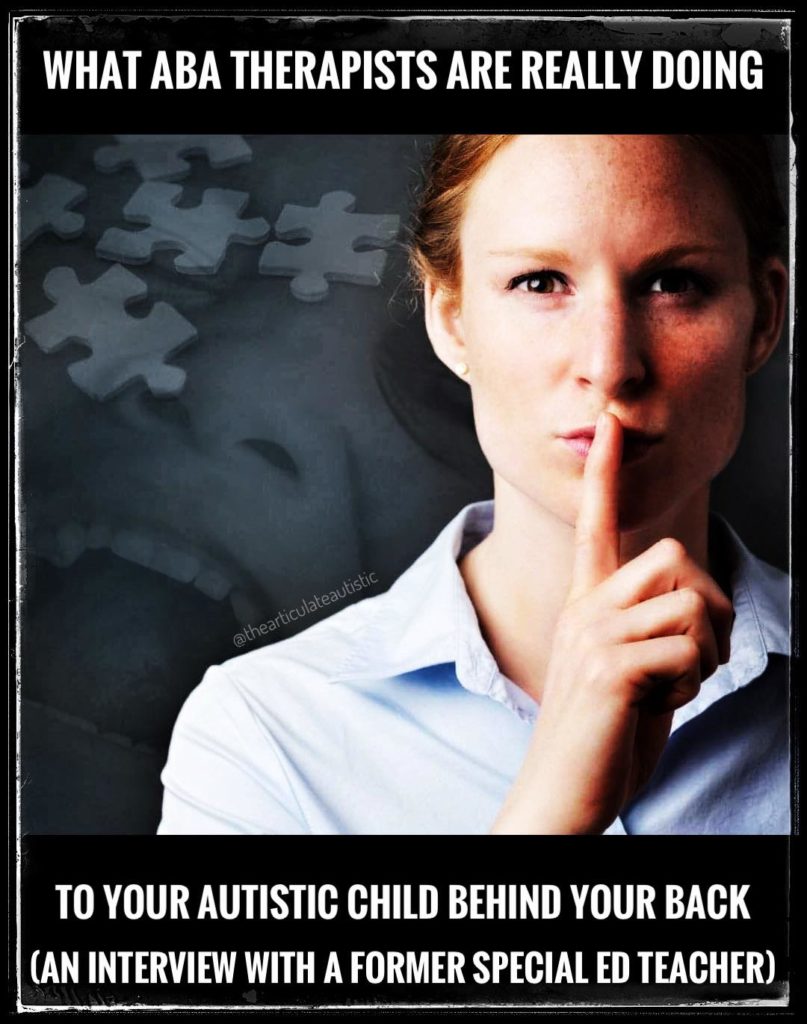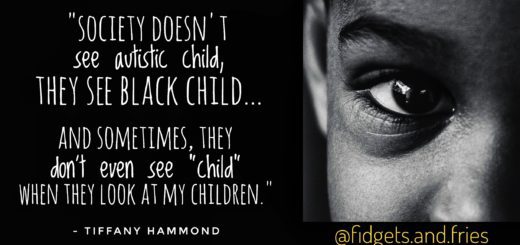What ABA Therapists Are Really Doing to Your Autistic Child Behind Your Back – An Interview with a Former Special Education Teacher

Kelly Redden of Logik Evolution reached out to me for permission to share a few quotes from one of my articles during a talk she’s doing in October. Once I saw her website, I wanted to interview her for my blog.
As a former special education teacher and autistic person, Kelly offers an insider’s look at ABA practices in schools that cause harm and trauma to its most vulnerable students.
After being fired 4 times for refusing to comply with what ultimately amounted to torturing children, Kelly went into business for herself and started consulting.
Below is her story and a word of warning to parents.
Jaime A. Heidel – The Articulate Autistic: What ignited the passion you have for working with autistic children?
Kelly Redden – Logik Evolution:
“I always had a passion for working with children, I graduated with a degree in Middle East history, hoping to teach this subject. I was living in CA at the time, and the school where I worked had a contained classroom with 9 autistic children. As soon as I began interacting with these kids, I knew this was my future, to work with these beautiful unique kids who I instantly had a connection with. A short time later, I embarked on my PgDip in analysis and intervention in learning disabilities in the UK, which was an autism centre of excellence known for its research.”
As soon as I began interacting with these [autistic] kids, I knew this was my future, to work with these beautiful unique kids who I instantly had a connection with.
AA: How long did you work in the special education field?
KR:
“I have been working in this field for 18 years, in 13 countries as a therapist, consultant and a teacher.”
AA: What were some things you loved about working in the special education field?
KR:
“I didn’t know it at the time, but recently I was diagnosed as being on the spectrum…I think this is why I have always felt so close and connected with others on the spectrum. Working with children was absolutely magical for me, watching them grow and learn, and most importantly being happy, and creating a safe environment where they could always be themselves, and be accepted. I loved to watch them flourish, and be happy, that’s the most important thing for me…their happiness.”
AA: What were some of the most challenging aspects of working in the special education field?
KR:
“The employers. Always. The problems and challenges always came from the people I worked for, which is why I stopped working with children because I could not stand by and watch them being treated horribly by people who were not open to new and more appropriate ways of working with these children. And even after working with adults, I still encountered people who were more interested in protecting their egos (i.e.., being unable to admit they are wrong in their treatment of people of the spectrum), so I decided once again to start my own business, so I would not have to encounter their emotional abuse or egos getting in the way of the care of others of my neurotype.”
AA: You were encouraged to use ABA with your autistic students. How did that come about, and when did you know it was something you could no longer ethically be a part of?
KR:
“It came about shortly after I graduated with my first graduate degree. I worked for a firm in Long Beach, CA and wasn’t happy with how restrictive they were with the children, always focusing on behavior charts and unnatural reinforcers. As I progressed through my career, I came to the conclusion quite quickly that ABA was a very harmful therapy, and it was not something I wanted to use with such a vulnerable population. Over the years, I worked (and got fired from) schools and behavior centers where the following practices were commonplace:
“Quiet rooms”
Edible reinforcers
Restraining and secluding the children
Uninformed, uneducated, and unskilled supervisor and management teams
Discrete Trial Training (DTT)
Training in restraint, the same as prison guards use on adults”
“ABA was something that became so ingrained in everyone’s minds that I couldn’t escape this type of therapy and becoming a BCBA was the only way to work in some countries. Although I can safely say that I have never met a BCBA that I would trust with my own child, due to their limited capacity in knowledge, there was always a lack of breadth and depth of knowledge due to the obscure way the licensing and qualification were set up.
I always had more education and more work experience than all of the BCBAs I worked with, and after examining how they worked, I wanted nothing to do with them. I finally decided, after avoiding it for over 10 years, that I would get the BCBA so I could work on my own, without any unethical management involved. I enrolled at a university in Florida, and the first module of 5 that I took was so obtuse, so obscure, it contained no applicable knowledge for working with children, or effectively teaching children…it was convoluted and useless information. A very big cog in the Autism Industrial Complex. I finished this module, but as I had thought for over a decade, it wasn’t worth my time or money.”
I always had more education and more work experience than all of the BCBAs I worked with, and after examining how they worked, I wanted nothing to do with them.
AA: Can you give some examples of the ways the practice of ABA did emotional, physical, and or mental damage to your students?
KR:
“ABA tries to constrain, control, and change the child and get the individual to conform to the agendas and expectations of others. Using non-autistic people as a baseline, ABA attempts to suppress stimming, the child’s way of communicating, interacting, and experiencing their world, forces eye contact, attempts to diminish creativity, isolates children, and decreases self-esteem. It tells the child they are not accepted for who they are, and it causes trauma later in life.
I saw miserable children being made to comply with unreasonable demands, taking away their independence and choices, forcing them into compliance and breaking them down and declaring that they have learned some new skills because they are too exhausted to fight off the therapists any longer.”

I saw miserable children being made to comply with unreasonable demands, taking away their independence and choices, forcing them into compliance and breaking them down and declaring that they have learned some new skills because they are too exhausted to fight off the therapists any longer.
AA: What do parents think ABA is rather than what it actually is? What do you believe causes this large gap in understanding?
KR:
“Parents I think, from my experience, believe the therapists straight away. Since ABA is, as they say, “the only scientifically-backed therapy available”, parents go with that, because, by this time, they are exhausted, desperate, and most likely unaware of the facts as this information is not prevalent on the internet.
Most doctors/pediatricians and clinicians all believe this is the best route, so as a parent, they grasp onto this, in the false hopes that their child will be ‘cured’; or worse yet, have their sense of self diminished so that they ‘appear like other children’. One of my goals now is to empower parents, give them choices, and tell them that this diagnosis of autism is not the end of the world, like those employed by the Autism Industrial Complex would like you to believe, it’s a scam and its trillion-dollar-a-year business that is destroying children’s lives, sapping parents of their savings, and tearing apart relationships.”
AA: You said you were fired 4 times for refusing to use unethical ABA practices with the autistic children you worked with. Can you elaborate more on that?
KR:
“It’s very simple, employers used bait and switch with me on several occasions, I would clearly explain my work ethic, and what I am willing to use and not willing to use whilst working with children. Once I arrived (it was always a job in another country, so once I made the decision to move, I had to try and continue as best I could, trying to avoid their unethical practices whilst working my way with the children). I refuse to use edible reinforcers, isolation rooms, behavior charts, or anything to do with ABA. As soon as this was discovered, I was asked to leave.
In one Middle East country where I worked, a boy was “misbehaving”, and the staff removed all of the furniture and resources from the little room, and they told me to put on body armor (the boy was 7 years old), stand in the doorway so he couldn’t leave, whilst 6 other staff members stared at him and took notes on his behavior charts. This went on for 3 to 5 hours.
If these practices were used in mainstream schools, the teachers would be arrested and the parents would sue, but somehow this behavior is OK to use with very vulnerable children? There is a complete lack of logic and common sense here. Unfortunately, this ABA therapy is ingrained into governments and health insurance companies, and to refute it causes aggressive behavior and is dismissed by those who profit from it. It’s a scare tactic used to manipulate parents and get their money. So much money has been spent on ABA, research, etc., yet there has been such minimal gain in peoples’ lives. This is the Autism Industrial Complex at work.
If these practices were used in mainstream schools, the teachers would be arrested and the parents would sue, but somehow this behavior is OK to use with very vulnerable children?
AA: Drawing from your knowledge and expertise in this field, what do you think should replace ABA for autistic children?
KR:
“I believe Montessori schools are a good alternative, because of the resources they use, and the independence in the learning process. Also, if schools had appropriately trained teachers in autism, about sensory needs, and would use concepts like UDL (Universal Design for Learning), and listen to the children, get to know them, they can teach you a lot about how to teach them.
I also saw a lot of progress with music therapy, OT, PT and speech therapy, depending on how these professionals were trained, only if not exposed to or utilizing any ABA concepts. Once you get to know the child, and what they find interesting, it’s easy to incorporate these choices in their learning.
Create a safe environment, laugh, have fun, include everyone, sing, dance, and make sure each child is accepted for who and what they are, allow stimming, allow them to engage with items however they want, and you will create a fantastic, healthy learning environment. The children will flourish and have a good sense of self, and confidence to carry them through to be healthy, well-adjusted adults.”
AA: You offer private consulting now. Will you share a bit about that and how interested individuals can work with you?
KR:
“Yes, at my company Logik Evolution, I work as an Autism Career Coach and Consultant. I provide consultation for individuals with autism, for example, offering ongoing support, tips on networking, job search strategies, interview preparation, navigating the workplace, and, most importantly, offering support, understanding and encouragement throughout the process. We will work together to increase their self-confidence and success while removing barriers to employment.
Consultations for companies consist of offering advice about recruiting, hiring, managing and retaining autistic talent. I do this by collaborating with the relevant stakeholders at an organization to create an inclusive hiring experience. I offer advocacy and accommodations that the individuals require in the workplace and how to set these up.
Also, dispelling myths and misperceptions about autism and offering accommodations to new and existing neurodivergent employees. Training in Autism is also available for management and staff.
For educational institutions, I offer advice on accommodations that can drastically improve the educational experience, training for all staff on autism awareness, dispelling myths, and misconceptions, how to establish a Student Resource Group (SRG) to create an inclusive environment and make a social impact, and I can offer suggestions on how to edit the school’s website, so that it will include content that reflects the institution’s dedication to inclusion and diversity.
Recruiters also need expert advice on how to design a successful recruitment strategy to attract autistic talent whilst dispelling myths and misperceptions about autism and offering accommodations to autistic students, training in autism awareness, whilst ensuring the company has a positive social impact by promoting autistic talent to their clients.”




